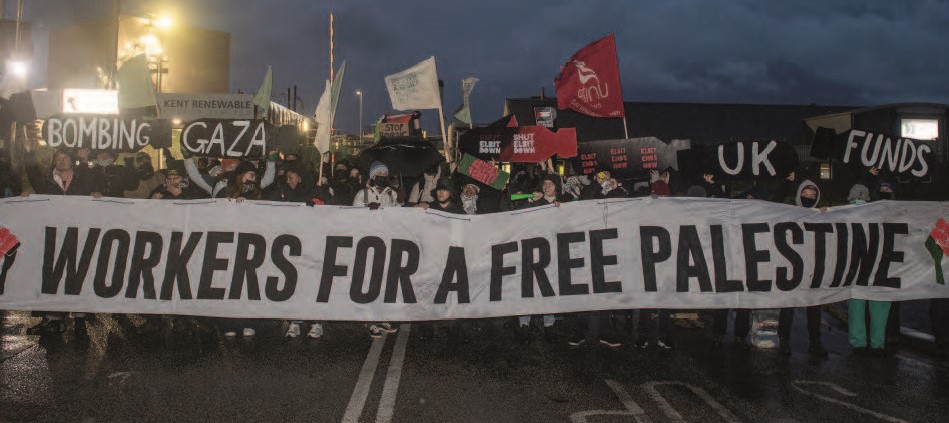

By George Banks
It’s been six months since the 7 October attacks and the start of Israel’s genocidal response. In that time the Palestine solidarity movement has mobilised an unprecedented response, with hundreds of thousands joining 12 national demonstrations.
But so far the solidarity movement has been unable to force a change in Britain’s foreign policy. It has not even been able to force a real change in Labour’s position. Although Keir Starmer has belatedly called for ‘an immediate ceasefire, the immediate release of all hostages and full humanitarian access into Gaza’, his shadow minister Pat McFadden confirmed Labour would continue selling weapons to Israel if elected, adding that Israel is ‘abiding by international humanitarian law’.
The people of Gaza face acute hunger and lack of clean water. Yet the US, Britain and Germany are still suspending funds to the United Nations Relief and Works Agency, which employs 13,000 people in Gaza, as a result of Israel’s unsubstantiated accusations that UNRWA was complicit in the 7 October attack.
Escalation
The Palestine solidarity movement, in conjunction with its counterparts across the world, needs to exert the maximum pressure on our governments to force them to completely halt their support for Israel’s genocidal war.
All the national and local groups involved in the solidarity movement and the trade unions must urgently organise city-wide assemblies of delegates and a national conference in order to plan a working class boycott of Israel, targeting arms and components suppliers in the first instance and building towards an all out assault against the UKs economic links with Israel.
Trade union leaderships should instruct their members to blockade all trade, cultural and educational links with Israel. To achieve this, militants must organise within the unions to build a campaign capable of breaking their bureaucracies from the chauvinistic line currently pursued by Starmer.
The CWU postal union has recently called for ‘an immediate ceasefire, for an end to the UK’s supply of weapons to Israel’ and condemned ‘the violations of international law by Israel’. Likewise Unison has has issued this statement to its members:
‘UNISON has condemned the unconscionable killing of over 33,000 Palestinians in Gaza, the majority being women and children, as well as the attacks on education, health and other public services. We are calling on the UK government to suspend the arms trade to Israel, given the clear risk that military equipment could be used in serious violations of international law.’
Now is the time to put words into action, by organising workplace protests, walkouts, boycotts and divestment campaigns. We should plan walkouts for the day Israel invades Rafah, Day X as it was called when Stop the War was protesting the military build-up for war against Iraq in 2003.
Demands
In the context of a genocide underway in Palestine, this is no time for half measures. The solidarity campaign should step up its action in pursuit of the following minimum objectives:
Last but not least, the solidarity movement must not disband or slacken its struggle in the event of a ceasefire or peace negotiations. The US, Britain and leading EU countries will try to impose an imperialist settlement that will translate in practice to a fragmented and disarmed statelet for the Palestinians, under a leadership handpicked by Israel and the West, a settlement which will inevitably leave at least half the people of Palestine exiled from their homeland.
The only sustainable solution for the region is a single state in Palestine with equal citizenship rights for both nations and the right of return for the Palestinian refugees. This state could ultimately only accomplish the reconciliation of its peoples by way of a working class seizure of power, in order to begin the construction of a socialist state in Palestine, with a planned economy, as part of a socialist Federation of the Middle East.